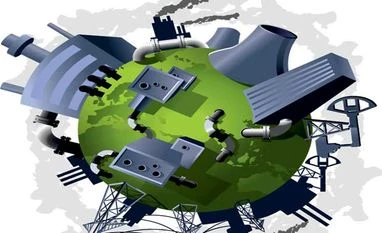The United States today said it had united with the European Union and 79 developing countries to jointly push for an ambitious accord in Paris to curb global warming.
The decision, announced by US Secretary of State John Kerry, came a day after the European Union said it had joined the African, Caribbean and Pacific nations most vulnerable to climate disasters to lobby for a far-reaching deal.
"This is a group of countries that is fully committed to ensuring the agreement is a truly ambitious one," Kerry said in Paris, where 195 nations are aiming to forge a pact to cut Earth-warming greenhouse gas emissions.
However, countries within the alliance dubbed the "high ambition coalition" by the United States have conflicting aims on some key points in the accord.
Low-lying small islands, for example, are calling on the world to cap global warming at less than 1.5 degrees Celsius above pre-Industrial Revolution levels.
The United States appears happy to leave the core goal at 2C, although it would accept a mention of the 1.5C target within the text.
"To be clear this is not a negotiating group," said Tony De Brum, the foreign minister of the Marshall Islands who was one of the key figures behind the formation of the alliance.
"It is rather about joining the voices of all those who are committed to an ambitious agreement and a safe climate future -- big and small, rich and poor," he told reporters.
"To do this we are building personal bonds between us as ministers, forging a joint resolve to fight together."
India -- which has balked at accelerating the review of carbon-cutting pledges and at setting the decarbonisation of the global economy as a goal -- is not part of the coalition.
Nor are economic giants China and Brazil.
Miguel Arias Canete, the European commissioner for climate action and energy, has called for other nations to join the group in the final hours of the UN talks, which have a Friday deadline for a deal to be signed.
Together, they are calling for a legally binding, fair, durable agreement in Paris that must set a long-term goal, be reviewed every five years and include a system for tracking progress.
"These negotiations are about all of us, both developed and developing countries, finding common ground and solutions together. That is why the EU and the African, Caribbean and Pacific countries have agreed to join forces for an ambitious outcome here in Paris," Canete said Tuesday.
Alden Meyer, climate change expert at the Union of Concerned Scientists, said the grouping started informally in July.
The emergence of a coalition among those most determined to make deep and verifiable emissions cuts may be seen as a sign that deep divisions remain as the delegates battle to put together a final deal.
The decision, announced by US Secretary of State John Kerry, came a day after the European Union said it had joined the African, Caribbean and Pacific nations most vulnerable to climate disasters to lobby for a far-reaching deal.
"This is a group of countries that is fully committed to ensuring the agreement is a truly ambitious one," Kerry said in Paris, where 195 nations are aiming to forge a pact to cut Earth-warming greenhouse gas emissions.
More From This Section
"Addressing climate change will require a fundamental change in the way we power our planet."
However, countries within the alliance dubbed the "high ambition coalition" by the United States have conflicting aims on some key points in the accord.
Low-lying small islands, for example, are calling on the world to cap global warming at less than 1.5 degrees Celsius above pre-Industrial Revolution levels.
The United States appears happy to leave the core goal at 2C, although it would accept a mention of the 1.5C target within the text.
"To be clear this is not a negotiating group," said Tony De Brum, the foreign minister of the Marshall Islands who was one of the key figures behind the formation of the alliance.
"It is rather about joining the voices of all those who are committed to an ambitious agreement and a safe climate future -- big and small, rich and poor," he told reporters.
"To do this we are building personal bonds between us as ministers, forging a joint resolve to fight together."
India -- which has balked at accelerating the review of carbon-cutting pledges and at setting the decarbonisation of the global economy as a goal -- is not part of the coalition.
Nor are economic giants China and Brazil.
Miguel Arias Canete, the European commissioner for climate action and energy, has called for other nations to join the group in the final hours of the UN talks, which have a Friday deadline for a deal to be signed.
Together, they are calling for a legally binding, fair, durable agreement in Paris that must set a long-term goal, be reviewed every five years and include a system for tracking progress.
"These negotiations are about all of us, both developed and developing countries, finding common ground and solutions together. That is why the EU and the African, Caribbean and Pacific countries have agreed to join forces for an ambitious outcome here in Paris," Canete said Tuesday.
Alden Meyer, climate change expert at the Union of Concerned Scientists, said the grouping started informally in July.
The emergence of a coalition among those most determined to make deep and verifiable emissions cuts may be seen as a sign that deep divisions remain as the delegates battle to put together a final deal.
)